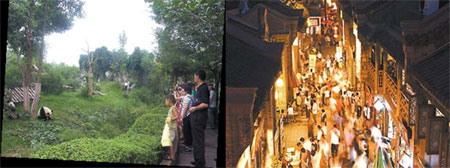|

|
|
Left: Pandas are still an attraction after the quake. Huang Zhiling Right: Night view of Jinli, Chengdu Ding Hao
|
Almost every Chinese knows two of his most famous lines: "Meat and wine go bad in lordly mansions, while the roads are strewn with bones of those killed by the cold." The lines are still quoted to condemn the sharp contrast between the lives of the haves and have-nots.
In 761, the thatched roof of his cottage was destroyed in a storm, which led him to think of the plight of other poverty-stricken scholars. Rather than wallowing self-pity, he composed a poem urging shelter for all the poor that said he would die content in his leaking cottage if the goal were achieved.
In addition to the aura of history and culture, the cottage grounds covering nearly 20 hectares are spacious, quiet and elegant.
Those without interest in history and culture, it is still a nice place for a leisurely stroll or drinking in its teahouse, said Caroline Portsmouth, an English visitor.
Hidden in thick greenery, the Temple of Marquis Wu in downtown Chengdu looks more like a garden than a centuries-old temple.
"It is a very interesting place," said Sun Chenbei, a visitor from Beijing. The temple was built as a memorial hall to commemorate Zhuge Liang (181-234), prime minister of the Shu Kingdom (222-263), who was awarded the title of Marquis Wu. It also houses the tomb of Liu Bei, the emperor of Shu Kingdom.
"I've never been to a place with so many manuscripts of ancient legends," Sun said.
The temple is one of the best-preserved remnants of the Three Kingdoms period (220-280) - the Wei, Shu and Wu - some 1,800 years ago.
The three states were locked in constant war, trying to reunify the country while creating legends passed down from generation to generation.
Covering 14 hectares and enclosed by red walls, the temple boasts relics from several dynasties including 47 gilded or painted statues of important figures in the Shu Kingdom, more than 50 stone tablets, 60 couplets and 10 tripods, ovens, bells and drums.